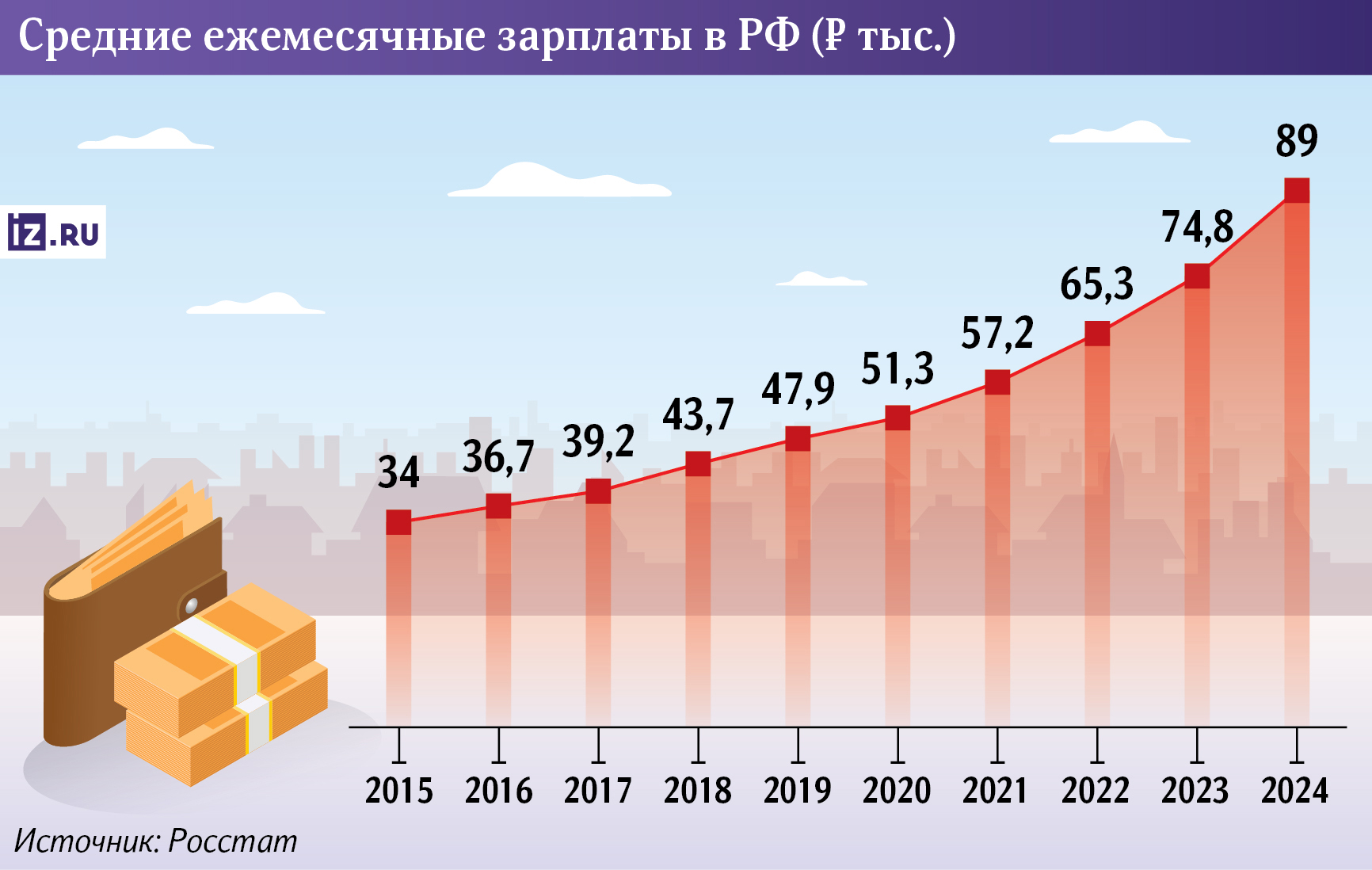- Статьи
- Economy
- Impatience and work: average salaries in Russia will rise to 100,000 by the end of 2025
Impatience and work: average salaries in Russia will rise to 100,000 by the end of 2025

Average salaries in Russia will rise to 100,000 rubles by the end of 2025, according to Izvestia's consensus forecast. At the beginning of the year, this figure was 89 thousand. The best earners now are in the IT sector, finance, and the extraction of raw materials, while blue-collar workers in transportation and manufacturing are the fastest to increase their salaries. However, salaries will grow more slowly this year, by only 12% compared to 18% in 2024. Why companies are not ready to raise wages as quickly as before, and what will happen to the economy in the face of a shortage of personnel — in the Izvestia article.
Salaries in Russia in 2025
By the end of the year, the average salary in the country will be about 100 thousand rubles, according to analysts from universities and market participants interviewed by Izvestia. We are talking about accrued income, that is, before taxes (a person will receive 87 thousand rubles in his hands). The most restrained estimates were given in the PSB — they expect that the average salary by December will not exceed 97 thousand rubles. The most positive forecasts in the Presidential Academy are more than 100 thousand.
At the beginning of 2025, the average salary was almost 89,000 - that is, as the experts surveyed expect, this figure will increase by 12% this year. For comparison, last year the average salary increased faster — by 18%.
At the same time, the Ministry of Energy predicts a more positive increase in citizens' incomes in 2025, to an average of 102.7 thousand rubles, according to the department's macro forecast. In any case, salaries should rise faster than inflation this year — prices should rise by 7.6%, the ministry expects.

Already, six industries can be distinguished, the average salary in which exceeds 100 thousand rubles, — we are talking about mining, IT and communications, scientific and technical activities, finance and insurance, construction, transportation and storage, told Izvestia in the Savings Bank. In these industries, salaries are generally the highest in Russia.
However, other sectors are in the lead in terms of revenue growth rate. The manufacturing industry remains the driver, and this trend will continue until the end of the year, says Viktor Lyashok, senior researcher at the INSAP Center of the IPEI Presidential Academy. That is, it is here that workers' salaries will increase the fastest.
In addition, this year, as in the past, salaries will actively increase in those industries that fulfill government orders, such as metallurgy, mechanical engineering and equipment manufacturing, Andrei Piskunov, Managing Director of the NKR rating agency, recalled. And also in taxi, catering, construction, turning — that is, in those industries that have faced the most significant outflow of foreign labor.
Incomes will traditionally increase more slowly than others in the public sector — among social workers, teachers, as well as in agriculture. The gap will remain if the government does not decide at the end of the year to index the sector significantly above the inflation rate, Viktor Lyashok believes.
Why wage growth will slow down in 2025
Since the middle of 2022, the labor market has been in a rather chaotic state, with supply and demand changing very dynamically. However, many companies have already begun to reduce the hiring of employees. Now, with a shortage of personnel, organizations still have to attract and retain valuable specialists (including through salary increases), as well as pay overtime for increased production, Andrei Piskunov noted. However, in 2025, the resources for salary increases are significantly reduced.
The main reason is the tight monetary policy of the Bank of Russia, says Lyudmila Rokotianskaya, an expert on the stock market at BCS World of Investments. She explained that most enterprises cannot afford expensive loans to expand production, so they do not want to increase staff and pay.
The strengthening of the ruble also played a role in the dynamics of salaries, Andrei Piskunov recalled. This reduces the income of exporters in ruble terms, as a result, raw materials companies — the leaders of our market — cannot afford to raise salaries as quickly as in recent years.
Another reason is the increase in income tax from 2025 from 20 to 25%, says Ekaterina Nezhnikova, professor at the Faculty of Economics at the Rudn University. Companies give more funds to the government, and they have less money left to attract higher-paid employees.
In addition, the Russian economy as a whole is slowing down, the expert noted. According to the forecast of the Ministry of Economy, GDP will grow by only 2.5% in 2025 against 4.3% a year earlier. Companies incorporate such plans into their business strategies, not daring to increase production.
— That is, the personnel shortage remains at the moment, but its severity is gradually decreasing against the background of more difficult conditions for business growth, weakening demand and a revision of investment plans. At the same time, the pressure on profits is likely to prevent companies from continuing to increase salaries at the same pace," explained Olga Belenkaya, Head of the Macroeconomic Analysis Department at Finam.
Over the past six months, unemployment has been at 2.3–2.4%, but experts interviewed by Izvestia believe that it will rise to 3% by the end of 2025.
Переведено сервисом «Яндекс Переводчик»








